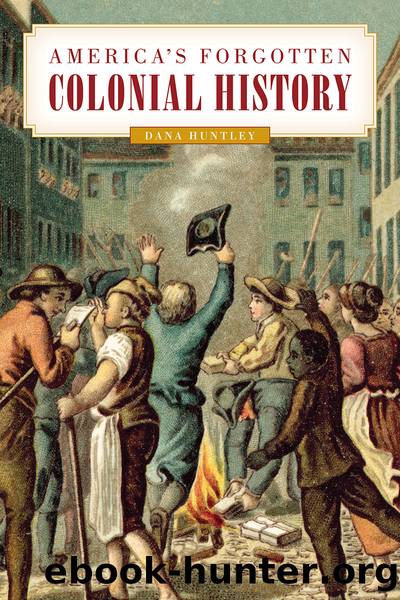America's Forgotten Colonial History by Dana Huntley

Author:Dana Huntley
Language: eng
Format: epub
ISBN: 9781493038480
Publisher: Lyons Press
In Virginia, on the other hand, the only church allowed in the fledgling colony was the established Church of England. Not only were other churches not permitted, but Sunday attendance at the parish Anglican Church was required by law. It wasnât until 1702 that something other than the established English church was legal in the colony.
THOSE CRAZY PURITAN COMMONWEALTH YEARS
Through the years of the 1650s, the Commonwealth actually worked far better than popular history usually gives it credit forâparticularly considering the significant reality that it had no historical precedence in Western civilization, or really any body of political philosophy on which to draw. This is still more than a generation before what we call âthe Enlightenmentâ and the emergence of the political theory that would undergird the arguments in the colonies for independence and a whole new form of federal government. John Lockeâs Two Treaties on Government and An Essay Concerning Human Understanding in 1689 were seminal works that came too late to aid the guiding hands of the Commonwealth.
Enter the Westminster Confession
The hot-blooded convictions of the Puritan Parliament were hardly uniform. There were Presbyterians and Independents (Congregationalists), Baptists, and those still in the Church of England. What united them, however, was a conviction that the English church required systemic reform and doctrinal clarity.
Despite the divergence of doctrinal and ecclesiastical views that emerged during the English Reformation, the notion that all these different versions of Christian faith and the churches they inspired could exist side by side and in civil and Christian harmony really hadnât been invented yet. Through the 1600s, it was largely just assumed that there was by natural and divine law an unbreakable connection between church and state, and that a state church was simply the order of things.
As relations between the King and Parliament had irrevocably broken down into war, in 1643 the House of Commons appointed an assembly of 151 theologians, academics, and clerics to tackle the problem and submit to Parliament a confession of faith and ecclesiastical practice that would accomplish just that. The commissioned assembly met 1,163 times over the next several years, in the crisis atmosphere of civil war, finally concluding in 1646. The Confession of Faith and Longer and Shorter Catechisms that they produced were each presented to and approved by Parliament in 1648. By the time the commission had completed its work, however, the House had fractured between Presbyterians and Independents and in practice the Westminster Confession of Faith ultimately never did become the defining doctrinal statement of the Church of England. Needless to say, the king and church episcopacy would have none of it.
Download
This site does not store any files on its server. We only index and link to content provided by other sites. Please contact the content providers to delete copyright contents if any and email us, we'll remove relevant links or contents immediately.
| Americas | African Americans |
| Civil War | Colonial Period |
| Immigrants | Revolution & Founding |
| State & Local |
In Cold Blood by Truman Capote(2694)
Steve Jobs by Walter Isaacson(2444)
All the President's Men by Carl Bernstein & Bob Woodward(1966)
Lonely Planet New York City by Lonely Planet(1849)
The Murder of Marilyn Monroe by Jay Margolis(1747)
The Room Where It Happened by John Bolton;(1724)
The Poisoner's Handbook by Deborah Blum(1667)
And the Band Played On by Randy Shilts(1623)
Lincoln by David Herbert Donald(1617)
The Innovators by Walter Isaacson(1601)
The Innovators: How a Group of Hackers, Geniuses, and Geeks Created the Digital Revolution by Walter Isaacson(1512)
A Colony in a Nation by Chris Hayes(1512)
Under the Banner of Heaven: A Story of Violent Faith by Jon Krakauer(1420)
The Unsettlers by Mark Sundeen(1344)
Amelia Earhart by Doris L. Rich(1343)
Birdmen by Lawrence Goldstone(1343)
Decision Points by George W. Bush(1255)
Dirt by Bill Buford(1242)
Zeitoun by Dave Eggers(1228)
